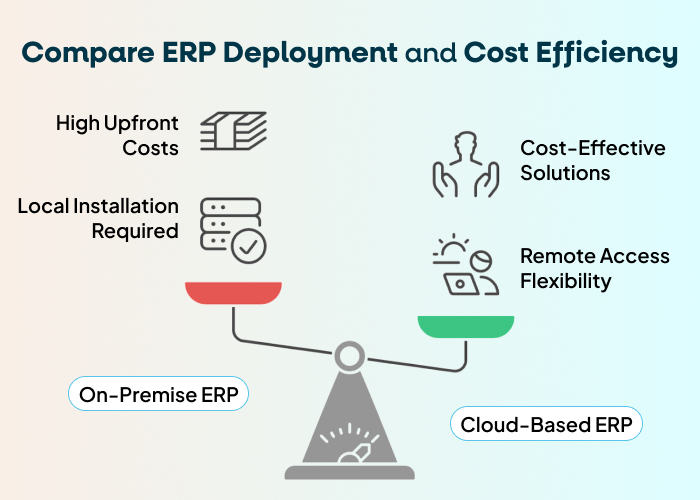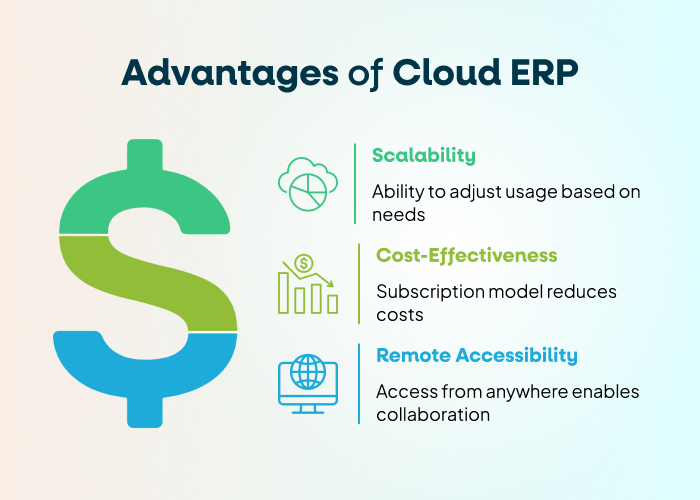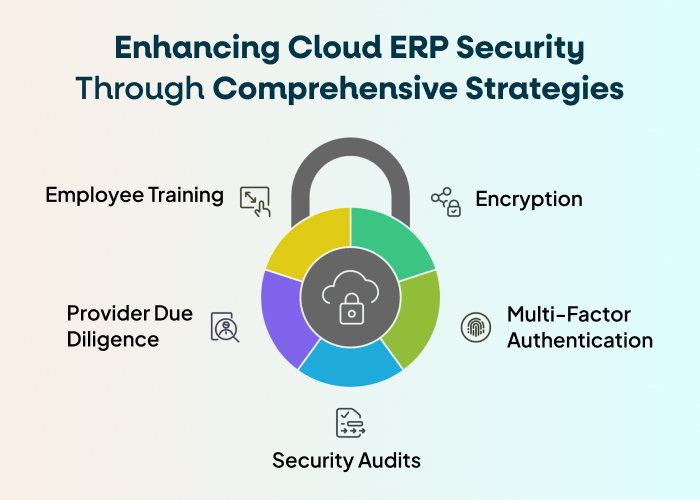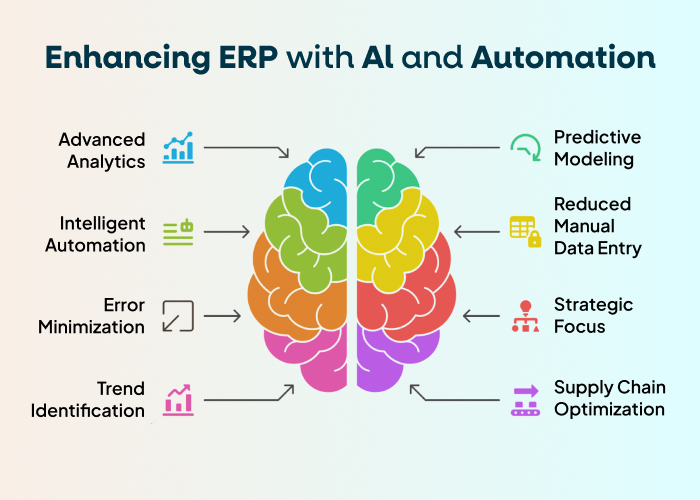Differences Between Cloud-Based and Traditional ERP

The primary distinction between cloud-based and on-premise ERP systems lies in their deployment and accessibility:
- On-Premise ERP: Installed locally on a company’s← servers, on-premise ERP requires substantial upfront investment in hardware, software, and IT infrastructure. Companies must also maintain dedicated IT teams to manage system updates, security patches, and ongoing maintenance.
- Cloud-Based ERP: Hosted on remote servers and accessed via the internet, cloud ERP eliminates the need for costly infrastructure investments. Providers manage system updates, maintenance, and security, ensuring businesses always have access to the latest features with minimal downtime.
Beyond deployment, these two models also differ in terms of customization, security, and cost structure. On-premise ERP often allows for extensive customization tailored to specific business needs, whereas cloud ERP solutions offer flexibility and scalability while maintaining standardized best practices.
Benefits of Cloud ERP

1. Scalability and Flexibility
One of the most significant advantages of cloud ERP is its scalability. Businesses can easily adjust their resource allocation as their needs evolve, whether expanding into new markets or adapting to seasonal demand fluctuations. This flexibility is particularly beneficial for small to medium-sized enterprises (SMEs) looking for cost-effective growth solutions.
2. Cost-Effectiveness
Cloud ERP typically follows a subscription-based model (Software-as-a-Service or SaaS), reducing the hefty upfront costs associated with on-premise systems. This allows companies to shift from capital expenditures (CapEx) to operational expenditures (OpEx), making financial planning more predictable. Additionally, businesses save on IT maintenance, as cloud providers handle upgrades, security patches, and troubleshooting
3. Remote Accessibility and Collaboration
The rise of remote and hybrid work models has increased the need for seamless access to business systems. Cloud ERP enables employees to access critical data from anywhere with an internet connection, fostering collaboration across departments and geographies. Real-time data sharing enhances decision-making, streamlines workflows, and improves overall productivity.
4. Popular Cloud ERP Solutions
Several cloud ERP solutions are available in the market, each catering to different business needs:
- AlianHub – A powerful SaaS-based ERP designed for businesses looking for AI-powered project management, resource allocation, and automation features. Businesses that require an intuitive and scalable solution often explore platforms like AlianHub for their ERP needs.
[ https://codecanyon.net/item/alianhub-project-management-system/51373823 ] - ClickUp – A versatile platform offering project management and ERP-like functionalities for task tracking, workflow automation, and team collaboration.
[ https://clickup.com/ ] - Jira – Widely used in agile development, Jira offers ERP capabilities through integrations and customization, making it a popular choice for software development firms.
[ https://www.atlassian.com/ ]
Security Concerns and How to Mitigate Them

Despite its numerous benefits, cloud ERP raises security concerns, primarily related to data breaches, unauthorized access, and compliance with industry regulations. However, leading cloud ERP providers implement stringent security measures to address these risks:
1. Robust Data Protection
Cloud ERP solutions leverage advanced encryption protocols to safeguard data during transmission and storage. Multi-factor authentication (MFA) adds an extra layer of security, ensuring only authorized personnel can access sensitive information.
2. Compliance and Regulatory Standards
Top cloud ERP vendors adhere to industry regulations such as GDPR, HIPAA, and SOC 2 to protect business and customer data. Companies should verify their provider’s compliance certifications to ensure alignment with security best practices.
3. Disaster Recovery and Backup Solutions
Cloud ERP providers offer automated backups and disaster recovery mechanisms, ensuring business continuity in case of data loss or cyber threats. Organizations should review their provider’s recovery time objectives (RTO) and recovery point objectives (RPO) to ensure minimal downtime in the event of a security incident.
4. Employee Training and Internal Security Policies
Human error remains one of the leading causes of data breaches. Businesses should invest in cybersecurity training programs to educate employees on recognizing phishing attempts, managing passwords securely, and adhering to best practices for data protection.
How AI & Automation Are Enhancing ERP Functionality

The integration of Artificial Intelligence (AI) and automation within ERP systems is revolutionizing business operations. AI-powered ERP solutions offer advanced capabilities that streamline processes, improve decision-making, and enhance overall efficiency.
1. Predictive Analytics for Smarter Decision-Making
AI-driven ERP systems analyze historical data to identify trends and predict future outcomes. This empowers businesses with actionable insights for demand forecasting, inventory optimization, and strategic planning.
2. Intelligent Process Automation (IPA)
Automation within ERP reduces manual tasks such as data entry, invoice processing, and inventory management. This not only minimizes human error but also allows employees to focus on higher-value tasks, improving overall productivity.
3. AI-Enhanced Customer Relationship Management (CRM)
AI-powered CRM within ERP systems personalizes customer interactions by analyzing behavioral data, preferences, and past interactions. This enables businesses to enhance customer engagement and drive sales growth through targeted marketing strategies.
4. Smart Supply Chain Management
AI optimizes supply chain operations by predicting demand fluctuations, detecting inefficiencies, and recommending cost-saving opportunities. Machine learning algorithms help businesses make data-driven decisions to enhance procurement, logistics, and inventory control.
Conclusion
The evolution of ERP from traditional on-premise systems to cloud-based solutions marks a paradigm shift in how organizations manage their resources. Cloud ERP offers compelling advantages, including scalability, cost savings, and remote accessibility, making it the preferred choice for businesses seeking agility and efficiency. However, security concerns must be proactively addressed through robust data protection measures, compliance adherence, and employee training.
Furthermore, AI and automation are reshaping ERP functionality, enabling businesses to optimize processes, enhance decision-making, and drive innovation. As organizations continue to adapt to changing market demands, understanding these ERP dynamics will be essential for leveraging technology effectively and maintaining a competitive edge in the digital era.
Ravi Bhojani is the Chief Marketing Officer (CMO) at Alian Software, where he spearheads the company’s marketing strategies and drives its brand presence in the competitive IT services landscape. With over a decade of experience in the technology and marketing sectors, Ravi has consistently demonstrated his ability to blend innovative marketing techniques with deep industry knowledge to deliver outstanding results.